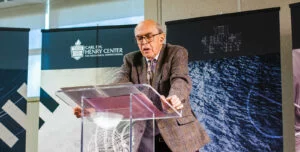The world we live in bears the hallmarks of humans who have exploited and plundered God’s creation with devastating results for our world. Deforestation, increasing species extinction, air pollution, the rapid increase in our climate, and lack of clean water mar the goodness and beauty of God’s creation in obvious ways. And ecological degradation almost always works out its harmful effects most powerfully on those who are already in poverty.
Might this be what Paul speaks of in Romans 8:19–22 when he refers to “creation anxiously waiting for the revelation of the children of God” (v. 19) and to “all of the creation groaning in labor pains until now” (v. 22)? Paul’s words in Romans 8 pose some difficult questions as it pertains to Christians and their posture toward creation.
First, does Paul’s language regarding God’s “subjection of creation to futility” (v. 20a) and “enslavement to corruption” (v. 21) refer to God’s good creation in Genesis 1–2 experiencing something of a natural fall? Is this, then, the reason our world is filled with thistles, decay, natural disasters, and death? Genesis 3:17 might also be invoked here as indicating that humanity’s sin results in the land being cursed;Paul’s words in Romans 8 pose some difficult questions as it pertains to Christians and their posture toward creation. and thus God is responsible for imposing death, decay, and corruption upon his creation due to human sin. This would certainly go against scientific consensus regarding life on this planet. And yet this reading has seemed a self-evident truth for many readers of Romans, thereby raising the question of the relationship between Scripture and science. Or, perhaps, there is a better interpretation?
In fact, and second, here it might be wise to ask, in what way does God’s story and purposes for humanity intersect with those for creation? After all, creation groans but so does humanity as it anticipates its resurrection body (v. 25). It may be that creation’s groaning and its subjection to futility refers less to a cosmic fall than it does to the story of creation’s need for a sanctified and transformed humans who do not rabidly exploit creation for its own advantage but who, instead, exercise a dominion over creation that enables it to flourish. The curse of Genesis 3 may refer not so much to an ontological fall, but to humanity’s alienation from the land as its faithlessness leads to lack of fruitfulness. Paul’s deep connection between the hope of creation and the “glorious children of God” (v. 21b) certainly suggests some kind of interdependence between creation and humanity. What is the proper way to construe this relationship?
Third, given the way in which humans have harmed and degraded God’s creation, some Christians have appropriately called us to give renewed attention to how we might steward God’s creation here and now; but does Romans 8, with its eschatological vision of God’s transformation of creation, provide the ground or any mandate at all for believers to engage in care for our ecology? If the primary problem now is that humanity is at fault for its failure to love and care for God’s creation, then this might provide some solid footing for more robust Christian ecological ethics. And yet, God’s future transformation of creation is spoken of by Paul as an eschatological certainty, and thereby, perhaps, as independent of human behavior.
In this Areopagite, four New Testament scholars (Siu Fung Wu, Jonathan Moo, Mark Seifrid, and Marcus Mininger) reflect upon the meaning of Romans 8:19-22 and the “groaning of creation.” What follows is a rich exegetical, ecological, and theological engagement of this text and its contemporary implications.







Comments
Be the first one to make a comment!